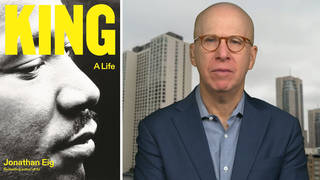
By Amy Goodman & Denis Moynihan
New Year’s Day offers a new beginning and a time to set goals. For the African American residents of the village of Rosewood, Florida 100 years ago, however, January 1st, 1923 was the beginning of a week of terror and mass murder, as a white mob descended on the mostly Black town, burning it to the ground. No one was ever prosecuted or held accountable for the Rosewood Massacre, and it was quickly erased from public awareness until an enterprising reporter uncovered its hidden history sixty years later. This week, descendants of massacre survivors and others are gathering jn Rosewood and in nearby Gainesville to mark the centennial of the slaughter and the resilience of those who escaped.
Rosewood was a town where many African American families owned their homes. While still under the yoke of Jim Crow, the settlement was largely self-sufficient – a place where Black families could achieve economic independence. The massacre was triggered when a white woman in the nearby town of Sumner claimed she had been assaulted by a Black man. A posse of white men launched a manhunt that continued for several days, culminating in a confrontation at a Rosewood home. A Black woman and two white vigilantes were killed. During this time, the Black residents of Rosewood fled, mostly into the surrounding forest and swamps.
The mob grew, killing any Black people they could find and setting fire to their homes. One white merchant, John Wright, had been hiding Black residents in his attic. He convinced the vigilantes to spare his home. Today, that house is the sole remaining structure in what was Rosewood. At least six African American residents were killed; eyewitnesses said the number was much greater. There was no official investigation into the violence, and both the perpetrators and the victims kept silent about it in the following decades.
Gary Moore was a St. Petersburg Times reporter out looking for a story about alligator hunters when someone in the region asked if he was investigating the massacre. That tip led him on a reporting journey to survivors, and ultimately to a long newspaper story detailing the lost history of the Rosewood Massacre. The late African-American reporter Ed Bradley did a segment on ‘60 Minutes’, and, in 1997, the late African-American director John Singleton released the feature film, Rosewood.
This week’s Rosewood Massacre commemorations coincide with our national holiday honoring Dr. Martin Luther King, Jr., who would have turned 94 years old on January 15th. One of the events borrows the name of a speech King gave in August, 1967, less than eight months before he was assassinated: “Where Do We Go From Here?”
“With all the struggle and all the achievements, we must face the fact, however, that the Negro still lives in the basement of the Great Society,” King said from the pulpit of the Ebenezer Baptist Church, addressing members of the Southern Christian Leadership Conference. “He is still at the bottom, despite the few who have penetrated to slightly higher levels. Even where the door has been forced partially open, mobility for the Negro is still sharply restricted. There is often no bottom at which to start, and when there is there’s almost no room at the top. In consequence, Negroes are still impoverished aliens in an affluent society.”
“They are too poor even to rise with the society, too impoverished by the ages to be able to ascend by using their own resources. And the Negro did not do this himself; it was done to him. For more than half of his American history, he was enslaved. Yet, he built the spanning bridges and the grand mansions, the sturdy docks and stout factories of the South. His unpaid labor made cotton ‘King’ and established America as a significant nation in international commerce. Even after his release from chattel slavery, the nation grew over him, submerging him. It became the richest, most powerful society in the history of man, but it left the Negro far behind.”
In the speech, King asked, “Why are there forty million poor people in America? When you begin to ask that question, you are raising a question about the economic system, about a broader distribution of wealth. When you ask that question, you begin to question the capitalistic economy.”
In 1994, the Florida legislature passed a landmark bill that paid $2 million to survivors and descendants of the Rosewood Massacre – a drop in the endless buckets of blood shed by African Americans, but still a hard-fought accomplishment. As we honor Dr. King, we must also demand just reparations for our too-often forgotten history of racist violence, to build a more just society.












Media Options